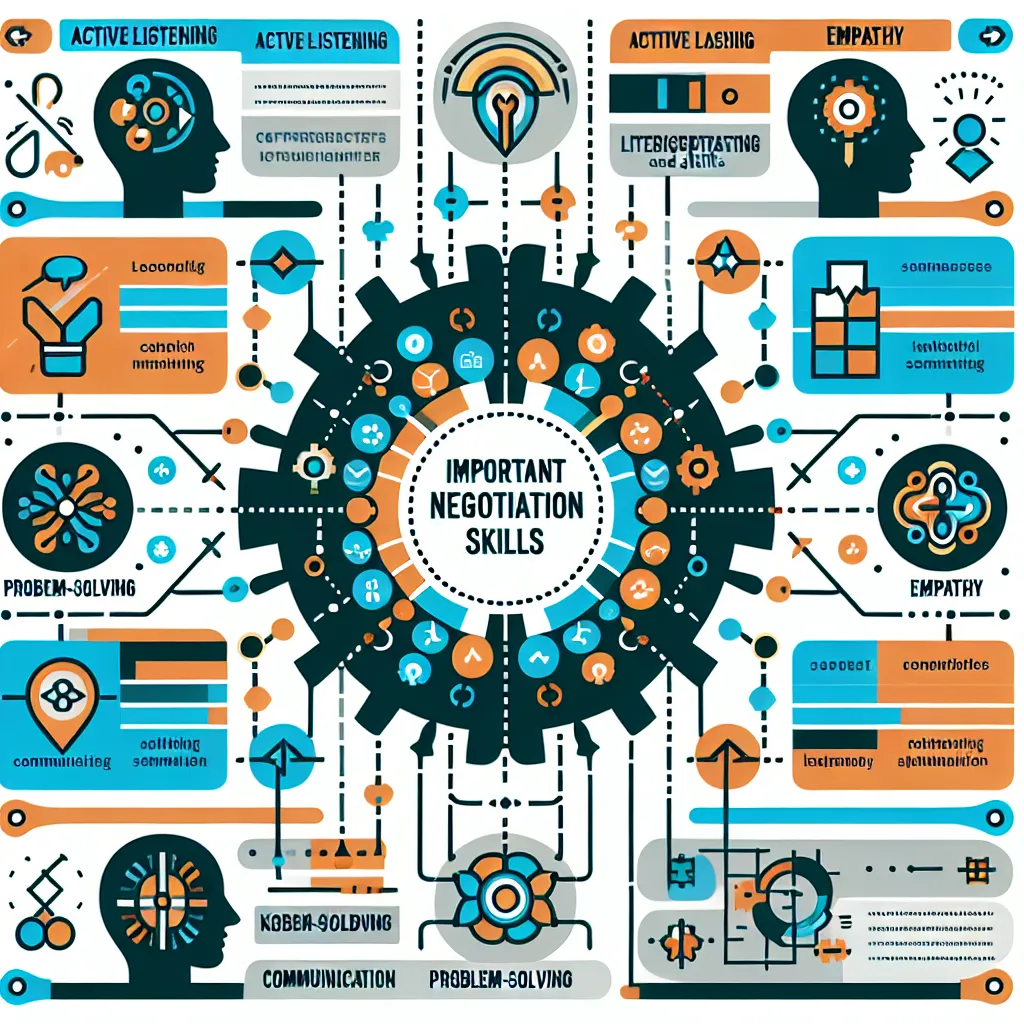Negotiation skills are crucial in many professional roles, and being able to effectively communicate these skills during an interview can significantly enhance your chances of landing the job. This article will guide you through the process of articulating your negotiation abilities to potential employers, providing you with valuable insights and practical tips to showcase your expertise.
Understanding the Importance of Negotiation Skills
Negotiation skills are highly valued in the business world as they contribute to resolving conflicts, securing deals, and fostering positive relationships. Employers seek candidates who can navigate complex situations, find win-win solutions, and represent the company’s interests effectively.
The Employer’s Perspective on Negotiation Skills
When assessing a candidate’s negotiation skills, employers typically look for:
- Communication abilities
- Problem-solving skills
- Emotional intelligence
- Flexibility and adaptability
- Strategic thinking
- Persuasion and influence
Understanding these aspects will help you tailor your responses to highlight your strengths in these areas.
 Negotiation Skills Interview
Negotiation Skills Interview
Strategies for Discussing Your Negotiation Skills
1. Prepare Specific Examples
When talking about your negotiation skills, it’s crucial to have concrete examples ready. Use the STAR method (Situation, Task, Action, Result) to structure your responses:
- Situation: Describe the context of the negotiation.
- Task: Explain your role and objectives.
- Action: Detail the steps you took to negotiate.
- Result: Share the positive outcome of your efforts.
For example:
“In my previous role as a sales manager, I was tasked with renegotiating a contract with our largest client (Situation). My goal was to increase our service fees while maintaining the relationship (Task). I researched the client’s needs, prepared a compelling presentation highlighting the added value we provided, and proposed a tiered pricing structure (Action). As a result, we secured a 15% increase in fees and extended the contract for an additional three years (Result).”
2. Highlight Key Negotiation Skills
When discussing your experiences, emphasize specific negotiation skills:
- Active listening
- Empathy
- Patience
- Creativity in problem-solving
- Assertiveness
- Analytical thinking
For instance:
“During the negotiation, I practiced active listening to fully understand the client’s concerns. This allowed me to empathize with their position and creatively develop solutions that addressed their needs while meeting our objectives.”
3. Demonstrate Your Understanding of Negotiation Principles
Show that you’re well-versed in negotiation theory and best practices:
- Win-win approach
- BATNA (Best Alternative to a Negotiated Agreement)
- Integrative vs. distributive negotiations
- The importance of preparation
You might say:
“I always strive for a win-win outcome in negotiations. In this case, I carefully prepared by identifying our BATNA and researching the client’s potential alternatives. This preparation allowed me to approach the negotiation with confidence and flexibility.”
4. Discuss Your Continuous Improvement
Employers value candidates who are committed to developing their skills:
- Mention relevant training or courses you’ve taken
- Discuss books or resources you’ve studied
- Explain how you reflect on and learn from each negotiation experience
Example:
“I’m constantly working to improve my negotiation skills. I recently completed a course on advanced negotiation techniques at [University Name], which has enhanced my ability to handle complex, multi-party negotiations.”
Common Interview Questions About Negotiation Skills
Be prepared to answer these frequently asked questions:
- “Can you describe a challenging negotiation you’ve been involved in?”
- “How do you prepare for important negotiations?”
- “What do you consider to be the most important skills for successful negotiation?”
- “How do you handle deadlocks in negotiations?”
- “Can you give an example of a time when you had to negotiate with a difficult person?”
Sample Answer for “Can you describe a challenging negotiation you’ve been involved in?”
“One of the most challenging negotiations I faced was when our company was merging with a competitor. I was part of the team responsible for negotiating employee retention agreements. The situation was tense, with conflicting interests and high emotions on both sides.
I approached this by first ensuring I fully understood the concerns of both our employees and the incoming management team. I organized several listening sessions and conducted anonymous surveys to gather comprehensive information.
Using this data, I developed a tiered retention package that addressed the primary concerns of key employees while staying within the budget constraints set by the new management. I presented this proposal using clear data visualizations and storytelling techniques to make the benefits apparent to all parties.
The negotiation lasted several weeks, with multiple rounds of discussions and adjustments. Throughout the process, I maintained open lines of communication, regularly updating all stakeholders and addressing concerns promptly.
Ultimately, we reached an agreement that retained 95% of our target employees and came in 10% under the initial budget projection. This success was attributed to thorough preparation, empathetic listening, creative problem-solving, and persistent, clear communication throughout the negotiation process.”
Common Mistakes to Avoid When Discussing Negotiation Skills
- Being vague or general: Always provide specific examples and outcomes.
- Focusing only on winning: Emphasize your ability to create value for all parties.
- Neglecting emotional intelligence: Highlight your ability to read and manage emotions.
- Overemphasizing aggression: Stress collaboration and problem-solving instead.
- Ignoring cultural sensitivity: Mention your awareness of cultural differences in negotiation.
How to Address These Mistakes
- Instead of saying, “I’m a great negotiator,” say, “In my last role, I successfully negotiated a 20% cost reduction with suppliers while improving delivery terms, resulting in a win-win situation.”
- Rather than “I always get what I want,” try “I focus on understanding all parties’ interests to create solutions that benefit everyone involved.”
- Replace “I don’t let emotions affect negotiations” with “I’m attentive to both verbal and non-verbal cues, which helps me navigate complex emotional dynamics during negotiations.”
 Negotiation Skills Diagram
Negotiation Skills Diagram
Follow-up Questions and Suggested Responses
-
Q: “How do you handle negotiations when there’s a significant power imbalance?”
A: “I focus on preparation and finding leverage points. Even in situations with power imbalances, I’ve found that thorough research can reveal unexpected areas of influence. I also work on building relationships and finding common ground to create a more collaborative atmosphere.” -
Q: “Can you discuss a time when a negotiation didn’t go as planned? What did you learn?”
A: “In a salary negotiation early in my career, I was too focused on a specific number and didn’t consider the total compensation package. The negotiation stalled, and I missed out on valuable benefits. From this, I learned the importance of considering all aspects of an offer and being more flexible in my approach.” -
Q: “How do you balance assertiveness with maintaining positive relationships in negotiations?”
A: “I believe in being assertive about interests rather than positions. By clearly communicating the ‘why’ behind my requests and actively listening to the other party’s needs, I can maintain a firm stance on important issues while fostering a collaborative atmosphere.” -
Q: “What strategies do you use to overcome impasses in negotiations?”
A: “When faced with an impasse, I first take a step back to reassess the situation. I often suggest a break to allow emotions to cool. Then, I try to reframe the issue, break it down into smaller components, or introduce new options. I’ve found that changing the perspective or bringing in new information can often unlock deadlocked negotiations.” -
Q: “How do you adapt your negotiation style when dealing with different cultures?”
A: “Before entering cross-cultural negotiations, I research the specific cultural norms and business practices. I pay attention to communication styles, decision-making processes, and attitudes towards time and relationships. I remain flexible and open to adjusting my approach, whether it means being more direct or indirect, focusing on building relationships first, or adapting to different time expectations.”
Conclusion
Effectively communicating your negotiation skills in an interview requires preparation, self-awareness, and the ability to provide concrete examples of your experiences. By highlighting your understanding of negotiation principles, demonstrating key skills, and showing a commitment to continuous improvement, you can position yourself as a valuable asset to any organization.
Remember to tailor your responses to the specific role and company you’re interviewing with, and always be prepared to discuss how your negotiation skills can contribute to the organization’s success. With practice and preparation, you can confidently showcase your negotiation abilities and increase your chances of securing your desired position.
For more tips on how to excel in job interviews, check out our article on how to talk about your interpersonal skills in an interview. Strong interpersonal skills often complement negotiation abilities, making you an even more attractive candidate.




